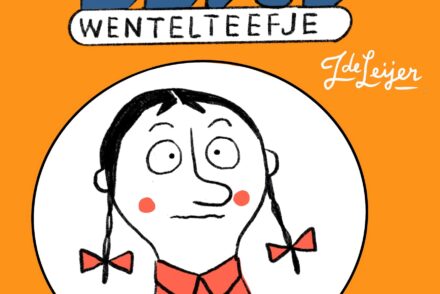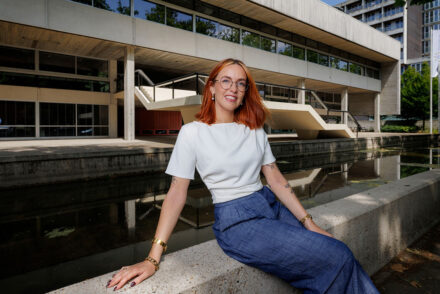Academic freedom is under pressure, but it is not (only) because of the usual suspects
There were years when academics could practice their craft with more peace of mind. For example, historian Nadia Bouras of Erasmus University received a sticker on her front door from Vizier op Links stating that her house was an “observed location.” It raises the question whether academic freedom in the Netherlands is under pressure, and if so, what is causing it. Univers talked about it with political philosopher and Academic Director of the Bachelor’s in Philosophy Dries Deweer and researcher and PhD researcher post-truth politics Natascha Rietdijk.

Ultra and extreme right-wing movements on the one hand and conspiracy theorists on the other: two groups that are not particularly keen on the academic community. Whilst ideologically, you would not necessarily place the two groups close together.
Yet, according to Rietdijk, the two indeed share common values. “In my research on anti-vaccination movements in Italy, I saw a kind of anti-authoritarian attitude, an anti-institutional attitude. At the same time, the leaders of those movements are seen as potential authorities of the future.
“The overlap between conspiracy thinking and populism lies in a distrust of existing authorities: a distrust of mainstream media, mainstream politics, and existing institutions,” says Rietdijk.
“You can also see that in what is happening in the Netherlands. Right-wing extremists and populists may recognize authority but that is only the authority of their political leader. And those leaders also present themselves as the only possible legitimate authority.”
In doing so, the dynamics that social media bring to public discourse have an amplifying effect, Rietdijk believes. “One of the problems with social media is that you are presented with content that is tailored to you. So if you’re already in radical circles, the messages you see will only make that worse.
“So when you see posts questioning the authority of scientists, it prompts you to read more articles along similar lines. So spreading fake news becomes easier because there is no gate keeper.”
Positive influence
Yet social media has a mostly positive impact on the position of academics in public discourse. It narrows the gap between citizen and academic. “Through social media, academics have more access to a platform,” says Dries Deweer.
“This allows them to take the initiative much more themselves to participate in the social debate. That also has a downside: namely, that you get bombarded with a lot of rubbish. That is regrettable, of course. But if you weigh up the pros and cons, I don’t think you can say that this is a negative development,” says Deweer.
Speaking as an academic
With access to a platform, the task of an academic or scientist does change, Deweer believes. After all, an academic title does not mean that you know more about every subject on which you express your opinion compared to someone without such a title. “So our task has become more complex because with access to the proverbial megaphone, we can spout our opinions about anything. So also on matters where our academic expertise does not lie. And in itself that is allowed, academics should not hold back from airing their opinions because they are also citizens and have that right.”
“But that opinion is sometimes unfairly given much weight by an academic title. Outside the realm of academic expertise, the opinion of an academic is not necessarily more or less credible than that of a citizen. I do therefore advocate making explicit when someone is speaking as an academic, and when they are not,” says the political philosopher.
Indeed, scientists have become the center of attention due to the coronavirus crisis. “Scientists suddenly have a historically visible impact on everyone’s daily lives,” Deweer continues. “When that impact is so visible, you’re also more likely to be the target of frustration. In itself, that’s not strange or cause for concern.”
He draws the line at threats to “someone’s physical integrity. We must never accept that. That situation is totally unacceptable.” But fortunately, it is rare, according to Deweer. “I don’t think you should draw too many conclusions from that.”
Small groups
With that, Rietdijk wholeheartedly agrees. “It is important to emphasize that the groups we are talking about are very small. They get a lot of media attention, which can distort the picture so that it seems that it is about a large group. Yet even small groups can have a lot of influence.
“A Vizier op Links, for example, feels very threatening. They themselves say it’s not meant to be. But more or less it says: ‘we are watching you’. Of course, that’s a very unpleasant feeling if you want to do your research freely but still get the feeling that you have to watch your words this way.”
Underfunding
According to Deweer, other factors have a more decisive impact on the work of academics. And that is simply about funding. “There is underfunding of academic education and the associated workload. In the process, universities are receiving lower and lower compensation per student.
“So what does much more social harm is that academics today actually don’t have time to engage in social debate. Educational duties take up much more time. Also, participation in that social debate is not at all factored into how your performance as an academic is assessed.”
“In awarding research funding, the emphasis is very much on scientific A-level publications,” Deweer continues. “As a result, there is less time to translate scientific insights into societal implications. That has a much greater impact on academic freedom.
“There is some good movement in that area. At the university, there is a project on recognition and rewards that pays attention to those points. But it’s a first step; there are still many to be taken,” Deweer said.
Self-fulfilling prophecy
Rietdijk also concurs. “As a PhD researcher, my research is already funded for the next few years and my educational load is not too bad. But what I see among my senior colleagues is that two things keep them from doing good research: educational funding and the high educational burden. And that’s interrelated. That has much more impact on how well we can do our work than some threats.
“In addition, I think it is also exaggerated how polarized the Netherlands is. It can also become a kind of self-fulfilling prophecyif you, as an academic, keep saying that society is becoming increasingly polarized. People can be sensitive to that kind of statement and get the feeling that they are obliged to polarize.
“When we talk about day-to-day impact, the manner and degree of research funding has a greater impact on academic freedom compared to threats.”






